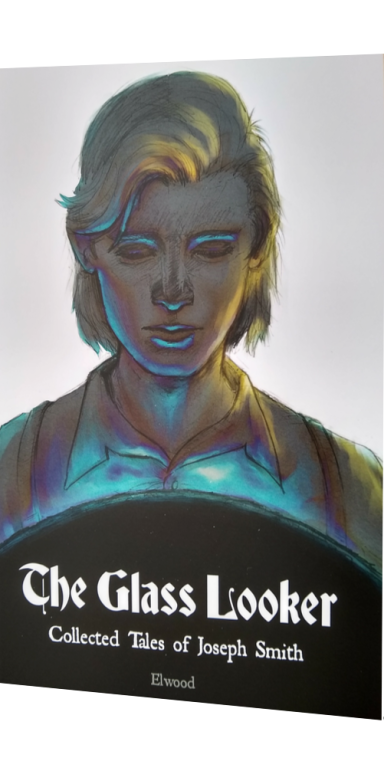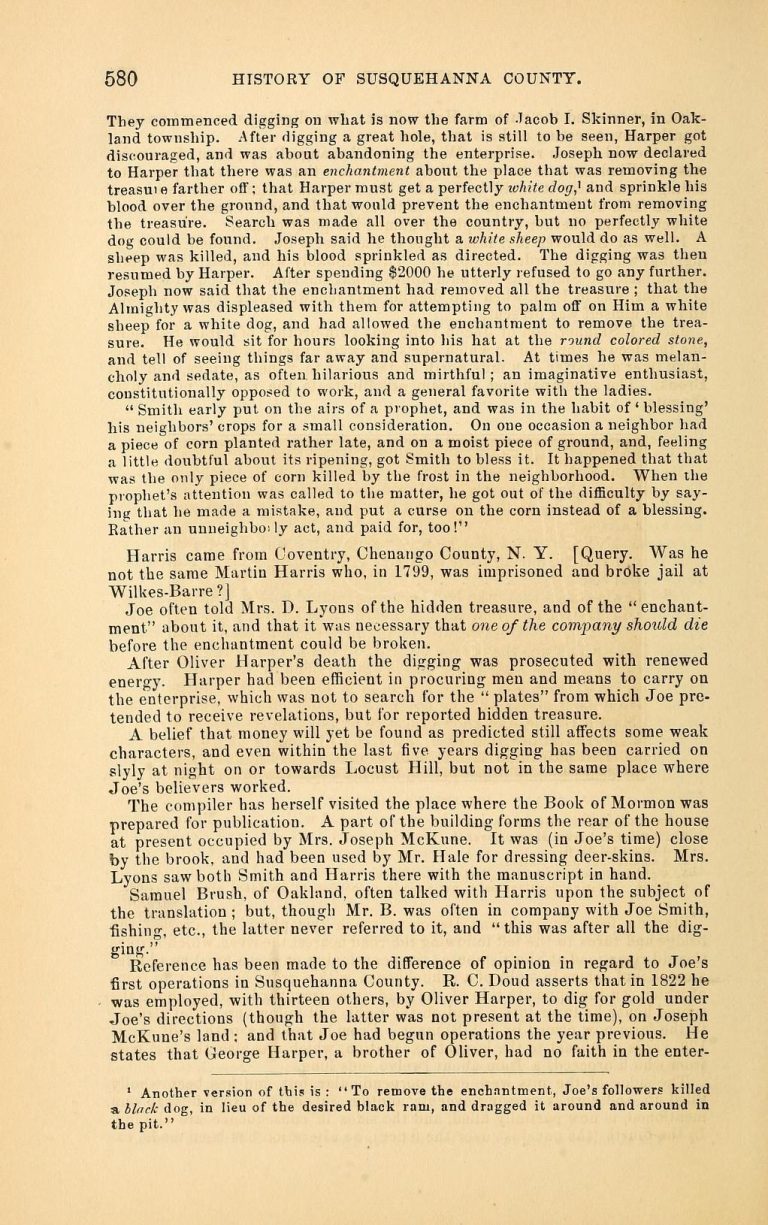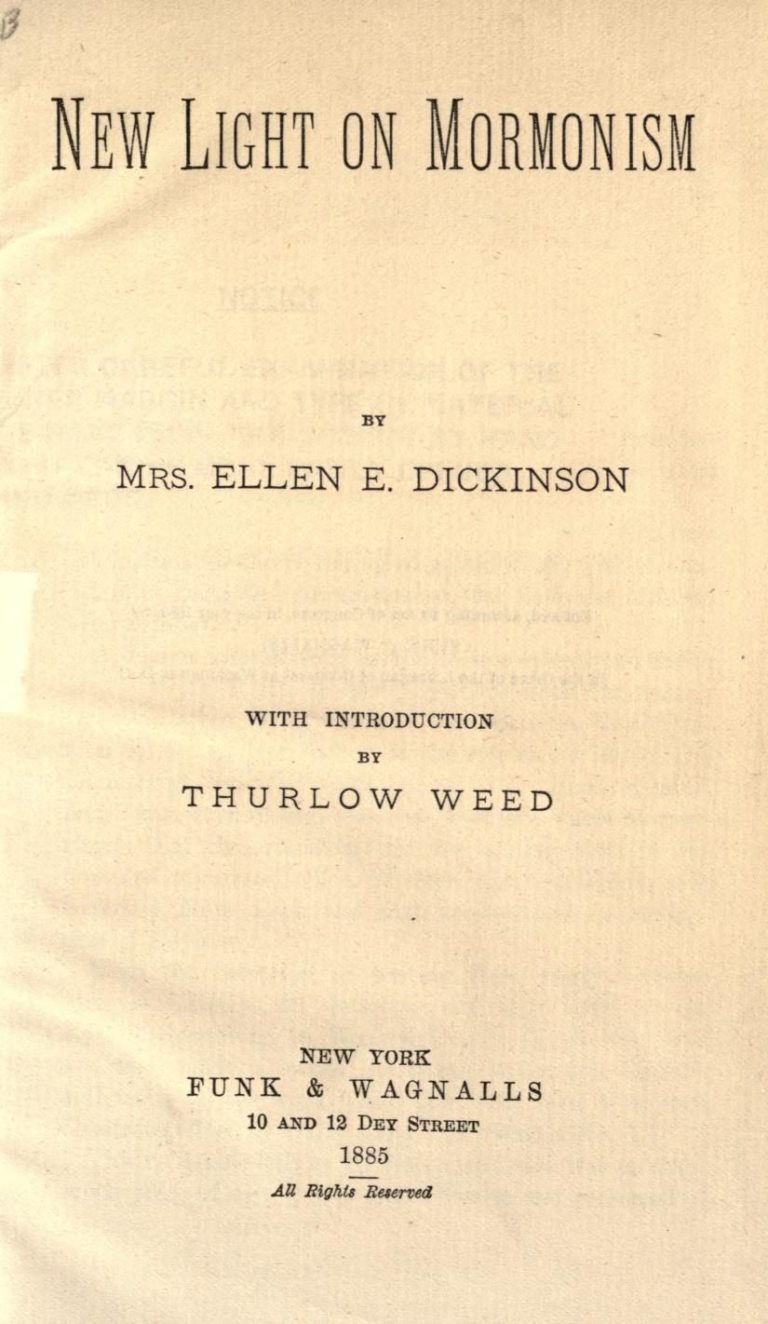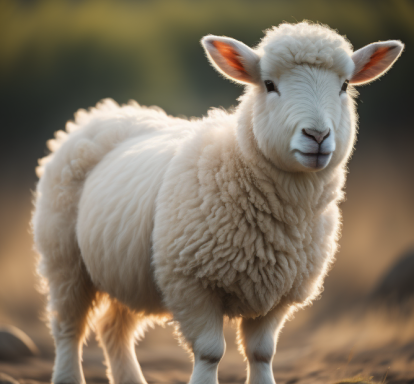Occultic Rituals
Joseph Smith's Magic Worldview
You might have heard the stories that Joseph Smith was a treasure digger. But how deep does Joseph Smith's magic worldview go? Did he truly believe in peep stones and divining rods and guardian spirits?
From the accounts given below, you will see that Joseph Smith believed in a number of occultic aspects and rituals. One might wonder, that if Joseph Smith once conned others to help him find buried treasure, couldn't the golden plates simply be a con? Another might ask, if these things were true then, why are they not true now?
- Seer stones
- Divining Rods
- Magic Spirits/treasure guardians
- Buried treasure
- Spells
- Enchantments
- Astrological practices
- Talismans
Overview of
Smith Family Relics
This video is a summary of the Smith family relics.
Magic Parchment
from the Smith Family
Jehovah, Jehovah, Jehovah Parchment
This image reflects a recreation of one of three magic parchments found among Hyrum Smith’s possessions. The above-depicted parchment is called the Jehovah, Jehovah, Jehovah Parchment because of the set of three Jehovahs in the upper right and the set of three Jehovahs in the upper left. The purpose of this parchment seems to be to protect its owner from evil. The center has a magical seal surrounded by scripture from Numbers 6:24-26, while the bottom right has the symbol for the demon Jubanladace.


Holiness to the Lord
of the Joseph Smith family
Holiness to the Lord Parchment
This parchment is called the Holiness to the Lord Parchment because of the phrase appearing on each side. The purpose of this parchment seems to be to procure a visitation from a supernatural being. Interestingly Mormon temples also have the inscription “Holiness to the Lord” on them. Note the large Jupiter symbol near the top, center of this magic lamen, an dcompare with Joseph Smith's Jupiter Talisman. The original parchment is in private possession.
Saint Peter Bind Them
of the Joseph Smith Family
Saint Peter Bind Them Parchment
The purpose of the St. Peter Bind Them Parchment seems to be to protect its owner from supernatural beings. Note the words in the upper right.The center bottom symbol is the symbol for a demon spirit called Pah-li-Pah flanked on either side by what appear to be two seals of the earth. The other side of the parchment bears a symbol for Nal-gah, an angel of
ceremonial magic.


Mars Dagger
Joseph Smith family's magic dagger
Toward the hilt, its blad was inscribed with Scropio's astrological symbol and with the magic symbol for the "Intelligence" of Mars. Its handle was inscribed with the magic "Seal" of Mars. Astrologically, Mars was the ruling planet of Joseph Smith Sr.'s birth year. This dagger was among the possessions of his patriarchal successor Hyrum Smith in 1844. The original is in private possession.
D. Michael Quinn, Mormon historian
1998
"In 1830 [Abner] Cole also claimed that Luman Walter(s) had a Latin book. Thus, Walter(s) possessed the necessary knowledge to understand the Latin in the Smith family's "Jehovah, Jehovah, Jehovah" magic parchment and in its sources (Scot and Sibly) . However, the handwriting on the Smith's family lamens does not seem to match Watler's handwriting twenty years alter. In any event, the inscriptions do not match the available handwriting of any member of Joseph Sr.'s family, but there is no handwriting sample for Alvin Smith. The handwriting does not match any of Smith's scribes nor any other known document of early Mormonism" [Early Mormonism and the Magic Worldview, pg. 131].

Jupiter Talisman
belonging to Joseph Smith
In 1937, the Improvement Era printed the letter from Charles Bidamon reporting that he had possession of many papers from Joseph Smith, which later proved to be authentic. He also reported having "a silver pocket piece which was in the Prophet's pocket at the time of his assassination."
Joseph Smith owned this Jupiter talisman which was among his most intimate possessions according to Emma Smith. The purpose of such a talisman was to help the owner have influence over others, become rich and powerful, and find peace. The inscription on the talisman comes directly from “The Magus” which was a magical book by Francis Barrett published in 1801. According to subsequent owners of the talisman, Joseph had this talisman in his possession when he was killed at Carthage. The Jupiter talisman is now in the possession of a private collector and no other photographs are available.
The Magus
Smith family spellbook
Published in 1801
Francis Barrett's multi-volume book was a mix of philosophy, magic, Christian theology, and occult traditions. Some of Barrett's words are quoted on Joseph Smith's jupiter talisman.


Occultic Sciences
Smith family spellbook
Published in 1807
This book outlines many of the occultic practices that the Smith family was invovled in. Interestingly, this book also shows some of the teachings of Emanual Swedenborg who blieved that "There are three heavens," described as "entirely distinct from each other." He called the highest heaven "the Celestial Kingdom," and stated that the inhabitants of the three heavens corresponded to the "sun, moon and stars."
[Link to Occultic Sciences book]
[Link to Emanuel Swedenborg's teachings in the book, pt. 821]
Willard Chase
Affidavit
1833
Willard Chase was a fellow treasure hunter with Joseph Smith senior and Joseph Smith, jr. Neighbor and physician John Stafford, recalled that Willard's sister Sally used a seer stone to locate treasure. Willard lived "over the hill to teh East" of the Smiths in Palmyra. He became acquainted with the Smith family in the year 1820. "At that time, they were engaged in the money digging business, which they followed until the latter part of the season of 1827." Below is part of Willard's 1833 affidavit.

"In the month of June, 1827, Joseph Smith, Sen., related to me the following story: "That some years ago, a spirit had appeared to Joseph his son, in a vision, and informed him that in a certain place there was a record on plates of gold, and that he was the person that must obtain them, and this he must do in the following manner: On the 22d of September, he must repair to the place where was deposited this manuscript, dressed in black clothes, and riding a black horse with a switch tail, and demand the book in a certain name, and after obtaining it, he must go directly away, and neither lay it down nor look behind him. They accordingly fitted out Joseph with a suit of black clothes and borrowed a black horse. He repaired to the place of deposit and demanded the book, which was in a stone box, unsealed, and so near the top of the ground that he could see one end of it, and raising it up, took out the book of gold; but fearing some one might discover where he got it, he laid it down to place back the top stone, as he found it; and turning round, to his surprise there was no book in sight. He again opened the box, and in it saw the book, and attempted to take it out, but was hindered. He saw in the box something like a toad, which soon assumed the appearance of a man, and struck him on the side of his head.--Not being discouraged at trifles, he again stooped down and strove to take the book, when the spirit struck him again, and knocked him three or four rods, and hurt him prodigiously. After recovering from his fright, he enquired why he could not obtain the plates; to which the spirit made reply, because you have not obeyed your orders. He then enquired when he could have them, and was answered thus: come one year from this day, and bring with you your oldest brother, and you shall have them. This spirit, he said was the spirit of the prophet who wrote this book, and who was sent to Joseph Smith, to make known these things to him. Before the expiration of the year, his oldest brother died; which the old man said was an accidental providence!"

Samuel Lawrence
Samuel was resident of New York in the 1820s and was an early associate of Joseph Smith. Samuel moved from New Jersey to Palmyra with his siter Fanny and her husband Abner Cole. Samuel and young Joseph engaged in "money-digging" (or treasure hunting).
Joseph Capron
8th November, 1833
I, Joseph Capron, became acquainted with Joseph Smith, Sen. in the year of our Lord, 1827. They have, since-then, been really a peculiar people—fond of the foolish and the marvelous—at one time addicted to vice and the grossest immoralities—at another time making the highest pretensions to piety and holy intercourse with Almighty God. The family of Smiths held Joseph Jr. in high estimation on account of some supernatural power, which he was supposed to possess. This power he pretended to have received through the medium of a stone of peculiar quality. The stone was placed in a hat, in such a manner as to exclude all light, except that which emanated from the stone itself. This light of the stone, he pretended, enabled him to see any thing he wished. Accordingly he discovered ghosts, infernal spirits, mountains of gold and silver, and many other invaluable treasures deposited in the earth. He would often tell his neighbors of his wonderful discoveries, and urge them to embark in the money digging business. Luxury and wealth were to be given to all who would adhere to his counsel. A gang was soon assembled. Some of them were influenced by curiosity, others were sanguine in their expectations of immediate gain. I will mention one circumstance, by which the uninitiated may know how the company dug for treasures. The sapient Joseph discovered, north west of my house, a chest of gold watches; but, as they were in the possession of the evil spirit, it required skill and stratagem to obtain them. Accordingly, orders were given to stick a parcel of large stakes in the ground, several rods around, in a circular form. This was to be done directly over the spot where the treasures were deposited. A messenger was then sent to Palmyra to procure a polished sword: after which, Samuel F. Lawrence, with a drawn sword in his hand, marched around to guard any assault which his Satanic majesty might be disposed to make. Meantime, the rest of the company were busily employed in digging for the watches. They worked as usual till quite exhausted. But, in spite of their brave defender, Lawrence, and their bulwark of stakes, the devil came off victorious, and carried away the watches. I might mention numerous schemes by which this young visionary and impostor had recourse to for the purpose of obtaining a livelihood. He, and indeed the whole of the family of Smiths, were notorious for indolence, foolery and falsehood. Their great object appeared to be, to live without work. While they were digging for money, they were daily harrassed by the demands of creditors, which they never were able to pay. At length, Joseph pretended to find the Gold plates. This scheme, he believed, would relieve the family from all pecuniary embarrassment. His father told me, that when the book was pubhshed, they would be enabled, from the profits of the work, to carry into successful operation the money digging business. He gave me no intimation, at that time that the book was to be of a religious character, or that it had any thing to do with revelation.He declared it to be a speculation, and said he, “when it is completed, my family will be placed on a level above the generality of mankind”!!
JOSEPH CAPRON
Lucy Mack Smith
1853
We supposed that Joseph had taken the plates, and hid them somewhere, and we were apprehensive that our enemies might discover their place of deposit. Accordingly, the next morning, after hearing of their plans, my husband concluded to go among the neighbors to see what he could learn with regard to the plans of the adverse party. The first house he came to he found the conjuror and Willard Chase, together with the rest of the clan. Making an errand, he went in and sat down near the door, leaving it a little ajar, in order to overhear their conversation. They stood in the yard near the door, and were devising plans to find "Joe Smith's gold Bible," as they expressed themselves. The conjuror seemed much animated, although he had traveled sixty miles the day and night previous.
Presently, the woman of the house, becoming uneasy at the exposures they were making, stepped through a back door into the yard, and called to her husband, in a suppressed tone, but loud enough to be heard distinctly by Mr. Smith, "Sam, Sam, you are cutting your own throat." At this the conjuror bawled out at the top of his voice, "I am not afraid of anybody — we will have them plates in spite of Joe Smith or all the devils in hell."
Willard Chase Statement
11 December 1833
Joseph believed that one Samuel T. Lawrence was the man alluded to by the spirit, and went with him to a singular looking hill, in Manchester, and shewed him where the treasure was. Lawrence asked him if he had ever discovered any thing with the plates of gold; he said no: he then asked him to look in his stone,to see if there was any thing with them. He looked, and said there was nothing; he told him to look again, and see if there was not a large pair of specks with the plates; he looked and soon saw a pair of spectacles, the same with which Joseph says he translated the Book of Mormon. Lawrence told him it would not be prudent to let these plates be seen for about two years, as it would make a great disturbance in the neighborhood. Not long after this, Joseph altered his mind, and said L[awrence] was not the right man, nor had he told him the right place.
About this time he went to Harmony in Pennsylvania, and formed an acquaintance with a young lady, by the name of Emma Hale, whom he wished to marry.—In the fall of 1826, he wanted to go to Pennsylvania to be married; but being destitute of means, he now set his wits to work, how he should raise money, and get recommendations, to procure the fair one of his choice. He went to Lawrence with the following story, as related to me by Lawrence himself. That he had discovered in Pennsylvania, on the bank of the Susquehannah River, a very rich mine of silver, and if he would go there with him, he might have a share in the profits; that it was near high water mark and that they could load it into boats and take it down the river to Philadelphia, to market. Lawrence then asked Joseph if he was not deceiving him; no, said he, for I have been there and seen it with my own eyes, and if you do not find it so when we get there, I will bind myself to be your servant for three years. By these grave and fair promises Lawrence was induced to believe something in it, and agreed to go with him. L[awrence] soon found that Joseph was out of money, and had to bear his expenses on the way. When they got to Pennsylvania, Joseph wanted L[awrence] to recommend him to Miss H[ale]., which he did, although he was asked to do it; but could not well get rid of it as he was in his company. L[awrence]. then wished to see the silver mine, and he and Joseph went to the river, and made search, but found nothing. Thus, Lawrence had his trouble for his pains, and returned home lighter than he went, while Joseph had got his expenses borne, and a recommendation to his girl.

Luman Walters
In 1822 and 1823, Walters served as a seer for a treasure dig on the property of Abner Cole in Palmyra, New York. Joseph Smith, Sr., ALvin Smith, and Joseph Smith Jr. reportedly participated in this dig. Walters possessed a magical book and a seer stone, which he used to locate buried treasure.
Mormon historian D. Michael Quinn has argued that Walters crafted the magical parchments owned by the Smith family, and Quinn theorizes that the young Joseph Smith looked to Walters as an occult mentor.
Pomeroy Tucker
1867
These pioneer Mormon disciples, so far as their names can now be recollected, were as follows, viz.: Oliver Cowdery, Samuel Lawrence, Martin Harris, Preserved Harris, Peter Ingersoll, Charles Ford, George Proj^er and his wife Dolly, of Palmyra;Ziba Peterson, and Calvin Stoddard and his wife Sophronia, of Macedon ; Ezra Thayer, of Brighton ; Luman Walters, of Pultneyville ; Hiram Page, of Fayette ; David Whitmer, Jacob Whitmer, Christian Whitracr, John Whitmer, and Peter Whitmer, Jr., of Phelps; Simeon Nichols, of Farmington ; WilliamStafford, Joshua Stafford, Gad Stafford, David Fish, Abram Fish, Robert Orr, King H. Quance, JohnMorgan, Orrin Ptockwell and his wife Caroline, Widow Sally Risley, and all the remainder of the Smith family, of Manchester.
It is believed that this list embraces all the persons residing at or near the prime seat of the Mormon advent, who from first to last made a profession of belief either in the money-digging or golden bible finding pretensions of Joseph Smith, Jr.; and probably, indeed, not more than one-half of these can be said to have been genuine converts under the one head or the other.
Pomeroy Tucker, Origin, Rise and Progress of Mormonism, pg. 39]
The Glass Looker
Mark Elwood
I recommend these books for anyone who wants to learn more about Joseph Smith's occultic practices. Mark Elwood's illustrations bring Joseph Smith's magic worldview to life!


Animal Sacrifice
During some of Joseph Smith's treasure digs, it was reported that an animal had to be sacrificed as part of the rituals to help ward off spirits, etc. What are the sources for this? What types of animals did the Smith's sacrifice?
Overview of Smith's Animal Sacrifices
This video is an overview of the sources below.

William Stafford
8 December 1833
William Stafford was a resident of Palmyra and one of the first settlers of the town. His farm was about a mile south of the Smith's land. He was described by Pomeroy Tucker as "a respectable farmer in comfortable circumestancs [Tucker, 1867, pg. 24]. Despite his negative feelings in the below account, William eventually shared an interest in treasure seeking. According to William's son John, he even owned his own peep stone.
At another time, they devised a scheme, by which they might satiate their hunger, with the mutton of one of my sheep. They had seen in my flock of sheep, a large, fat, black weather. Old Joseph and one of the boys came to me one day, and said that Joseph Jr. had discovered some very remarkable and valuable treasures, which could be procured only in one way. That way, was as follows:—That a black sheep should be taken on to the ground where the treasures were concealed—that after cutting its throat, it should be led around a circle while bleeding. This being done, the wrath of the evil spirit would be appeased: the treasures could then be obtained, and my share of them was to be four fold. To gratify my curiosity, I let them have a large fat sheep. They afterwards informed me, that the sheep was killed pursuant to commandment; but as there was some mistake in the process, it did not have desired effect. This, I beheve, is the only time they ever made money-digging a profitable business. They, however, had around them constantly a worthless gang, whose employment it was to dig money nights, and who, day times, had more to do with mutton than money.
Joseph & Hiel Lewis
Statement
30 April 1879

We are unable at this time to give precise dates, but some time previous to 1825, a man by the name ofWm. Hale, a distant relative of our uncle Isaac Hale, came to Isaac Hale, and said that he had been informed by a woman named Odle, who claimed to possess the power of seeing under ground, (such persons were then commonly called peepers) that there was great treasures concealed in the hill north-east from his, (Isaac Hale’s) house. By her directions, Wm. Hale commenced digging, but being too lazy to work, and too poor, to hire, he obtained a partner by the name of Oliver Harper, of [New] York state, who had the means to hire help. But after a short time, operations were suspended for a time; during the suspension, Wm. Hale heard of peeper Joseph Smith, jr., wrote to him, and soon visited him; he found Smith’s representations were so flattering that Smith was either hired or became a partner with Wm. Hale, Oliver Harper, and a man by the name of Stowell, who had some property.
They hired men and dug in several places, as described in the History of Susquehanna. Co., page 579. The account given in the said history at page 580, of a pure white dog to be used as a sacrifice to restrain the enchantment, and of the anger of the Almighty at the attempt to palm off on him a white sheep in place of a white dog, is a fair sample of Smith’s revelations, and of the God that inspired him. Their digging in several places was in compliance with peeper Smith’s revelations, who would attend with his peep-stone in his hat, and his hat drawn over his face, and would tell them how deep they would have to go; but when they would find no trace of the chest of money, he would peep again, and weep like a child, and tell them the enchantment had removed it on account of some sin or thoughtless word; finally the enchantment became so strong that he could not see, and so the business was abandoned. Smith could weep and shed tears in abundance at any time, if he chose.

History of
Susquehanna County
1873
This history was written by Emily C. Blackman in 1873.
They commenced digging on what is now the farm of Jacob I. Skinner, in Oakland township. After digging a great hole, that is still to be seen, Harper got discouraged, and was about abandoning the enterprise. Joseph now declared to Harper that there was an enchantment about the place that was removing the treasure farther off; that Harper must get a perfectly white dog, and sprinkle his blood over the ground, and that would prevent the enchantment from removing the treasure. Search was made all over the country, but no perfectly white dog could be found. Joseph said he thought a white sheep would do as well. A sheep was killed, and his blood sprinkled as directed. The digging was then resumed by Harper. After spending $2000 he utterly refused to go any further. Joseph now said that the enchantment had removed all the treasure; that the Almighty was displeased with them for attempting to palm off on Him a white sheep for a white dog, and had allowed the enchantment to remove the treasure. He would sit for hours looking into his hat at the round colored stone, and tell of seeing things far away and supernatural. At times he was melancholy and sedate, as often, hilarious and mirthful; an imaginative enthusiast, constitutionally opposed to work, and a general favorite with the ladies.
"Smith early put on the airs of a prophet, and was in the habit of ' blessing' his neighbors' crops for a small consideration. On one occasion a neighbor had a piece of corn planted rather late, and on a moist piece of ground, and, feeling a little doubtful about its ripening, got Smith to bless it. It happened that that was the only piece of corn killed by the frost in the neighborhood. When the prophet's attention was called to the matter, he got out of the difficulty by saying that he made a mistake, and put a curse on the corn instead of a blessing. Rather an unneighborly act, and paid for, too!"
Hiel Lewis
Rejoinder
4 June 1879

Friend Cadwell, you say Messrs. Lewis would have us believe that [Joseph] Smith, [Josiah] Stowell, and others were such idiots as to offer in sacrifice a white dog, etc. Whether fools or idiots, or not, we would have you believe that they did just such absurd things. And it is no greater stretch of credulity than it is to believe what you and others do of Joseph Smith. The facts are that the sacrifice of white dogs, black sluts, black cats, and such like was an indispensable part or appendage of the art which Smith, the embryo prophet, was then practicing. He claimed to possess the supernatural power of second sight, or to see things at a distance, and deep under ground, and his frequent references to "the enchantment,” proves that he was a conjurer, a sorcerer, which Webster defines as “an enchanter,” and sorcery as witchcraft, or intercourse with the devil. That this was his occupation has been proven by his father-in-law, Isaac Hale, and many others, relatives and friends. Mr. Hale says in his affidavit, “Smith’s occupation was that of seeing, or pretending to see by means of a stone in his hat, and his hat closed over his face.” In this way he gave directions where and how to dig, (for the chest of money) and when the workmen failed to find the treasure at the designated place, he would make those engaged in the work believe that “the enchantment” had removed the treasure to another place.
The History of Susquehanna County has a plat of these diggings, the principal excavation, and four smaller ones, on the farm now owned by J[acob] I. Skinner, some of them not wholly obliterated to this day. Now, as Smith could see the enchantment remove the deposits, and gave directions where next to dig, and how to proceed, he must of necessity give directions what sacrifice was necessary to propitiate the enchantment.—So we have no reason to doubt the truth of the statement about the white dog, and the black slut, and that something of the kind took place each time the enchantment removed the treasure. It is hard to believe that men of common intelligence could believe that Smith could thus see, and believe in his conjuration; be so foolish as to spend thousands of dollars in such a way; but Smith translated his book of Mormon, mostly with this same peep stone and hat—he, sitting in his house, and the plates hid far away; and it is just as hard to believe in this inspired translation as to believe in the fact and efficacy of his dog sacrifices.—Friend Cadwell, for you or Mr. [Michael] Morse, or any other person to state that you never heard of, or knew anything of certain alleged transaction, is no evidence against the truth of those who do know, have seen, and heard. That is, your ignorance cannot be admitted as conclusive proof against what others have seen and heard. Neither is bombast and ridicule argument or evidence.
We know that nine tenths of Smith’s inspired utterances, while in Harmony, Pa., proved false, and his miraculous power a sham, yet there were some besides the money diggers, who believed that Smith was what he claimed to be, “nearly equal to Jesus Christ.” That he had power to raise the dead, and if they were to throw away either the old bible or the book of Mormon, it would [should] be the bible. Friend Cadwell, you look upon the reports of Smith’s money peeping, dog sacrifice, etc. as so foolish and wicked that you cannot believe that he or any other person could be thus employed. And yet you believe that he, Smith, was the prophet of God, and by inspiration translated the book of Mormon, and that his inspired qualities should be measured by the number of his followers. Now apply this same measurement to Mohammed, and his millions of followers. You will not allow that Mohammed was anything but a false prophet. Smith translated the book of Mormon by means of the same peep stone, and under the same inspiration that directed his enchantments and dog sacrifices; it was all by the same spirit. Christ says “by their fruits ye shall know them;” and by the application of Christ’s rule, we know that Smith was a fasle [false] prophet, to be sure, not equal to Mahommed. Friend Cadwell, I accord to you honesty and sincerity. Let me also tell you that you are laboring under a delusion. Again you say Messrs. Lewis were quite young, but mere boys,—were not actors, and took no part in the matters they claim to remember so well.—Elder, you are again testifying about matters that you know nothing about. I was the younger of these “mere boys.” Let me say, I was then old enough to do a man’s day’s work, and did so, using Smith’s oxen and plow, and plowed some very stony ground, and well remember Uncle Isaac Hale’s remarks about Smith’s plow I was using. Just how Smith obtained said oxen I am unable from personal knowledge to tell. But undisputed report was that Smith said to one of his disciples, (in another place) “The Lord says you must give me those oxen,” and the disciple did as he was requested.
Sally McKune, Mehetable Doolittle, Elizabeth Squires, Jacob I. Skinner, and Samuel brush interviews with Frederick G. Mather
July 1880
But just mark the valuable services of the Saint’s “peek-stone.” Every time it got track of the treasure, and enabled the faithful to dig toward it. The third hole was sunk about fifteen feet, when the treasure waltzed around on the other side of the big hole. Now the Saint had a vision; blood must be shed; it must be the blood of a black sheep, sprinkled all around the diggings. The faithful were mighty glad to hear of this, for they were tired of trying to catch a ton of silver which went like a nimble sixpence, and had so much the advantage of them in dodging about. There was a charm about it, for the Prophet said so, but ten prophets could not make them believe there was a charm about the work. That wasn’t the kind of men they were, and the Mormons have never been that kind of men.
In all the country around Susquehanna there was not a black sheep. The nearest thing to a black sheep was a black dog, and the Prophet thought that might answer. The dog was killed, and its blood sprinkled about the ground where the silver was. The silver never went away any great distance after that, but it waltzed around the big hole in a manner to defy the dexterity of pick and shovel. Frequent drifts were struck out from the big hole, but the silver couldn’t be coaxed with the blood of a black dog, nor cornered by tunneling. The Prophet decided that some man must be killed; that some of their number must be slaughtered and become a sacrifice to appease the charm that had the silver under its arm and was playing hide and seek with them. Until that was done the prize would escape them, and there was no use of digging against fate. He called for a volunteer, but none of the faithful could spare themselves for that purpose. For the simple reason that no Marcus Curtius, could be found to throw his manhood into the breech, to step forward and have his head cut off for the great benefit of those who were left, this magnificent enterprise was abandoned, and all the silver there ever was in that mountain lies there until this day. When we reflect upon the great number of people who sacrifice themselves for wealth, it seems strange that the founder of Mormonism could find no sacrifice except a black dog which was little better than nothing in its operations. And it is not likely that he obtained the consent of the dog.
Oliver Harper, one of the number employed in the digging, and who furnished some of the sinews of war, was soon afterward shot by Jason Treadwell, near Joe Smith’s house, while returning from a rafting expedition down the Susquehanna. The Saint thought this would answer for a sacrifice, and rallied the faithful to dig some more; but the charm remained stubborn, and would not come within sight of anybody with the silver, except the Prophet with his “peek-stone,” and the “peek-stone” business was pretty nearly played out in this neighborhood. There was too much hard work and perspiration about it to be clearly connected with a day of miracles.
The Prophet turned his attention again toward Palmyra, and the hidden treasure in that neighborhood, but was supposed by Mr. Hale and his family to be in pursuit of furniture for housekeeping. He was accompanied by his wife’s brother Alvah, who officiated as teamster. When they returned to Susquehanna it was learned that the Saint had brought with him the wonderful golden plates. It is recorded in the Book of Mormon that after the prize was won and delivered to the Prophet by angels, his eyes were opened and he saw legions of devils contending against a celestial host to keep the golden bible hid. What the devils wanted to keep it hid for is hard to understand. Such conduct certainly showed great shortsightedness in them, and they are not supposed to be a superficial race. The Book of Mormon does not record all. It does not tell where the Prophet went immediately after the golden plates were won and delivered to him.

Alfred Trumble
1881
There was only one business the Smiths indulged in with any show of industry. When they were sober enough (for they were lusty topers) they were perpetually digging for buried treasure. Next to this pursuit they starred in the nefarious one of sheep stealing. In 1833 upwards of sixty leading citizens of Wayne County, who were called upon to depose as to the character of the Smiths, testified under oath that they were immoral, false and fraudulent, and that the hopeful Joseph was the worse of the lot.
Emily Austin
Autobiography
1882
Emily Colburn (Coburn), is the younger sister of Sally Knight who was the wife of Newel Knight. She joined Mormonism in 1830. She moved to Kirtland Ohio in 1831. She later moved to Nauvoo where she became disillusioned and left the church.
Concerning her authobiography, Larry C. Porter said: "Despite a number of inaccuracies, she gives the reader some valuable historical insights which are not found elsewhere."

Old Uncle Joe [Knight], as we called him, was a wool carder, and a farmer; yet he abandoned all business, and joined with a number of others, to dig for money on his premises. While I was visiting my sister, we have walked out to see the places where they had dug for money, and laughed to think of the absurdity of any people having common intellect to indulge in such a thought or action. However, all of those things had long since become oblivious; for in the time of their digging for money and not finding it attainable, Joe Smith told them there was a charm on the pots of money, and if some animal was killed and the blood sprinkled around the place, then they could get it. So they killed a dog, and tried this method of obtaining the precious metal; but again money was scarce in those diggings. Still, they dug and dug, but never came to the precious treasure. Alas! how vivid was the expectation when the blood of poor Tray was used to take off the charm, and after all to find their mistake, that it did not speak better things than that of Abel. And now they were obliged to give up in despair, and Joseph went home again to his father’s, in Palmyra.

Ellen E. Dickinson
1885
When Joe wanted fresh meat for his family, he gave out that it would be necessary to insure the success of the "diggers," as these worthies were called, by having a black sheep killed, as a sacrificial offering, before going to work.
Nan Hill
Account
1939
Nan Hill Stratton (1882-1972) was a resident of Oxford, Chenango County New York. She wrote an undated seven page typscript titled "Beginnings of Mormonism."

A Mr. Wakeman told of one night coming upon Joe Smith and a band of followers back of Scott’s tavern at Nineveh. Mr. Wakeman was motioned away by the men, but concealed himself in the bushes, watched Joe withdraw from the others, then return, saying God had revealed to him that this was enchanted ground. Then, to the horror of Mr. Wakeman, Smith burned a black dog belonging to Deacon Stowell. This was for a sacrifice to appease the wrath of the avenging angel. Mrs. Davenport of Doraville said she repeatedly heard her grandmother tell of Joe Smith coming into her home one day, long after she was married, and saying that it had been revealed to him that she was to be his “spiritual wife.” She replied with the broom stick and he unceremoniously left the house. ...
© Copyright. All rights reserved.
We need your consent to load the translations
We use a third-party service to translate the website content that may collect data about your activity. Please review the details in the privacy policy and accept the service to view the translations.



